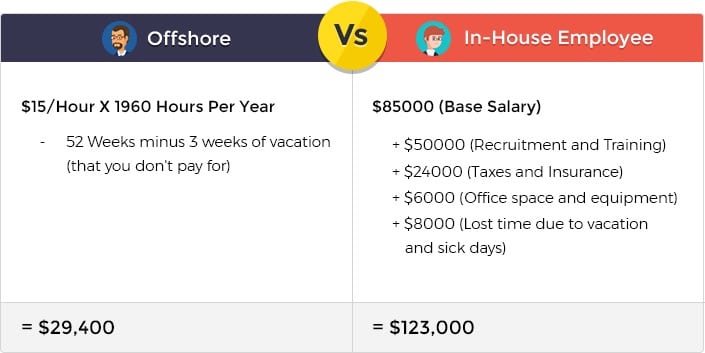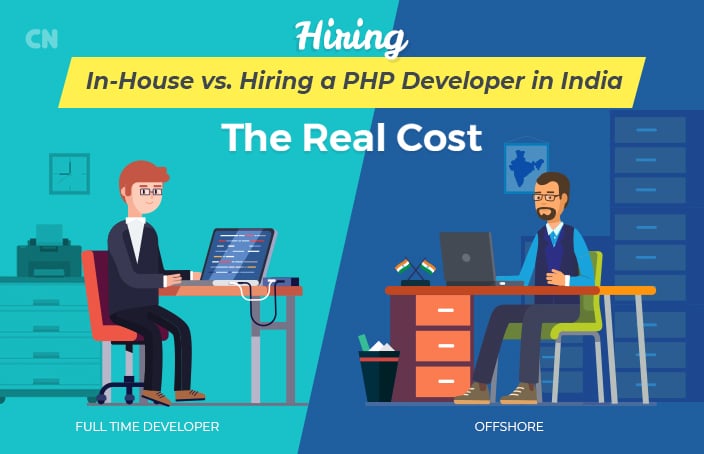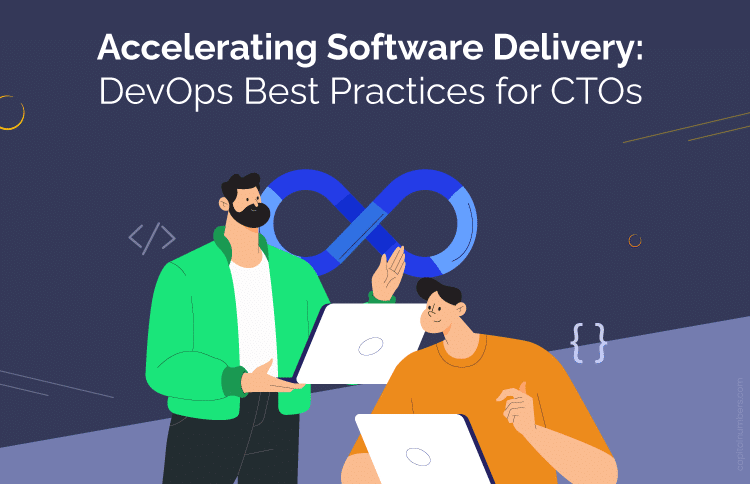Hiring In-House PHP developers vs. Hiring PHP Developer in India: the REAL Cost
Table of Contents
What model suits you best? When you add up the costs, it might not be as straightforward as you think.
Anyone who’s had to deal with the frustration and eventual satisfaction of hiring the right employee knows what a challenge it can be. Connectivity and the Internet has introduced new viable hiring models; remote work and offshore developers are available to anyone with an internet connection.
But, perhaps counterintuitively, it seems to have made finding the perfect employee as difficult a task as ever. The pool of developer talent is only growing. The most highly skilled developers get snatched up by huge companies like Google, leaving you to select from a massive group of people who all have mostly similar talents and qualifications.
Still, making the effort can be rewarding. Striking the right balance of full-time employees and remote developers will make your business cost-efficient, adaptable, and healthy in the long term. This applies doubly when we’re talking about developers, specifically PHP developers — keeping one or two on staff is incredibly expensive, even more expensive than their $85,000 annual salary will let on. But remote PHP developers are actually quite cost efficient, and can be a perfect compliment to your core team.
To find and hire the perfect in-house PHP developer is an expensive endeavor. It requires persistence and even a little luck. Another option is to hire a remote developer for a specific project. But on the other hand, hiring remotely comes with its own set of problems.
So how can you be sure that you’re getting the best performance available from each of these options?
Your Two Options
We’re going to perform a quick cost analysis of the costs and benefits associated with each hiring model. For our purposes, let’s assume that you’ve got a PHP-heavy project that will take a year to develop. Here are your two hiring options:
1. You can hire a full-time PHP developer for an average of $85,000 / year.
2. You can hire an offshore PHP developer in India for around $15 an hour.
These two employees will function in different ways. A full-time hire will integrate into your company culture take the time to learn the business in detail, and eventually become a valued, full-time team member. The offshore hire will also learn a little about how the company works, but they’ll be far more focused on learning the needs of the project quickly so they can perform efficient work as per your requirements.
Training and Recruitment: A Huge Investment
A US-based PHP developer making about $85,000 a year will usually have at least four years of formal schooling, meaning they exist in a competitive space and will be costly to recruit and train.
Estimates place the costs of hiring a new employee between .5 and 2x the annual salary. So simply hiring a developer could cost between $50,000 and $170,000, before they even do any work. Although training is one of highest costs of hiring an employee, it’s an important investment — one that might pay dividends in the long term.
(It’s important to note that there is no actual promise of quality even when you take care to hire a candidate that looks good. You can take into account factors such as schooling, experience, and past project completed. But there’s simply no guarantee that the person you hire will be as effective as their salary demands).
In this area, offshore developers excel. It’s in the nature of developers to be able to ramp up for a project quickly, with minimum notice and training. They will know exactly what the project requires — especially if you’ve taken care to vet a good one and give them a detailed job description.
Benefits for A Full-Time Hire
You also have to pay your full time employees benefits. Depending on your status, you could be paying health coverage, life insurance, dental insurance, eye insurance, a 401k, and more.
Some estimates put the real cost of hiring an employee, when including all these benefits, at 1.35 times base salary — which would put our total yearly cost of a full time PHP developer at $114,750. (Remember, that’s in addition to the initial recruiting and training costs)
Taxes
Taxes are slightly difficult to quantify, because they will vary depending on where you are. Businesses in Western Europe will pay a different set of taxes than businesses in Canada.
For example, let’s take a look at the United States. If you’re based in the US, then you might have a payroll tax (15% of an employee’s salary), social security (Social Security – 6.2% per employee wage), Medicare (1.45% on each employee’s salary), Federal Unemployment Insurance (6% on first $7,000), and worker’s compensation (varies).
If your PHP developer is on a $85k salary, then when you throw all this together you can end up with around $24,000 owed in taxes each year. You might hire an accountant to try to keep costs down for you, but that’s yet another expense.
There is no tax on hiring a PHP developer in India (yet).
Office Space
If you hire an in-house employee, you must be prepared to provide them the equipment they need to do the work. Maybe they have their own computer and would prefer to bring that in; but even if that’s the case, renting office space can be $500 per month, or between $5,000 – $6,000 a year.
Remote developers, of course, are required to come equipped with everything they need. So here is another area where you’ll be saving money by hiring remotely.
Vacation and Paid Days Off
This can be tricky to quantify, but let’s just assume that on average, your employees get between three weeks of a vacation and 5 – 6 sick days per year. For someone making an $85,000 wage, that’s a little over $6,000 lost to vacation and paid days off. Again, the advantage goes to offshore developers, who only get paid for the hours they work.
Let’s Compare the Numbers
Assume 40 hours a week for the entire year, and 49 weeks a year. That’s 1,960 hours a year. 1,960 x 15 = $29,400 for a full time PHP developer in India.
Compare that to our full time employee. If total yearly costs = $114,750 plus the cost of training and recruitment (let’s just say $50,000) then you’re looking at $164,750 for a full-time employee.
Here’s what the numbers look like –

You could comfortably hire four developers and still be under budget for just one full time, in-house PHP developer.
And that isn’t including the cost of office space and equipment, or time lost to vacation and sick days, both of which vary widely in price, and don’t have to be provided to the remote developers.
Michael Solomon, an entrepreneur and the founder of 10x Management, a prominent tech talent agency, has this to say:
“As the numbers indicate, if you are looking for a long-term solution to a problem, a deeply dedicated team member, or you know that you will need someone on a project for many years, then hiring a full-time employee might make financial sense. But if you have a project that needs to be done in the short or medium-term, or you need to satisfy demand at peak times or any of these other reasons, then hiring freelancers is a very viable and financially sound alternative.”
Solomon also recommends building a team consisting of a dedicated in-house developer doing 30% of the work, and the remaining 70% taken up by agile freelancers.
Also Read: Top Benefits of Hiring a Dedicated PHP Developer
In Conclusion
Some might raise objections about hiring remote developers in India, citing skill and experience requirements. But actually the skill disparity is minimal.
While there might be some disparity at the beginning, there is very little difference in talent between an American developer with five years of experience and a Chinese developer with the same experience.
If you’ve taken the time to properly vet your developer, give them clear job descriptions, and manage their tasks, they can be every bit as effective on a project-to-project basis as an in house developer.
There are a number of services that take care of everything for you. The remote hiring model recommended by certain companies like Capital Numbers makes this easy. We take care of all the vetting and management for you — for example, all our employees are competitive talent, with over three years of experienced, all supervised by a technical lead. You also get to interview your developer and select from a flexible range of pricing plans.
Under such a model, it’s easy to have a skilled PHP developer your staff, while also quickly ramping up and taking care of work on a per-project basis with a team of remote developers.
In the end, having a skilled PHP developer as part of your in-house team is a good investment. But they should only account for a portion of your workload. It’s much better to also enjoy the flexibility and low price options that remote developers give you, in addition to a dedicated team member.
If you have any more questions that weren’t covered in this article, leave a comment or message us directly.















